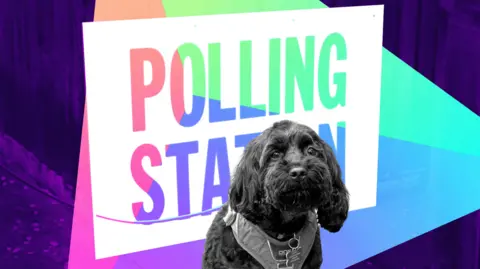Chris Mason: A wildly unpredictable local elections
18 minutes agoChris MasonPolitical editor•@ChrisMasonBBC

 BBC
BBCIf last year’s general election was all consuming and everywhere, this year’s local elections, in truth, are neither.
That is not to denigrate for a moment how much they matter in the places where they are happening, nor the extent to which they will mould the mood of national politics in their aftermath.
But the reality is there are not many contests this year, not least because some have been postponed because of an imminent shake-up in local government structures in some places.
So there is a very good chance you are reading this in a part of the country without any contests.
And there is a good chance too, given what I hear from the political parties, that your heart might not be pulsating in ecstasy even if the community centre down the road is morphing into a polling station tomorrow.
I detect a curious paradox right now: anger confronts an expectation of widespread indifference.
Turnout in local elections that do not coincide with a general election are almost always shrivelled.
But what I pick up anecdotally – I’ve just spent the last few days in Lincolnshire, reporting on the race to be the county’s first directly elected mayor – matches what the research group More in Common has picked up in focus groups.
The group’s UK Director, Luke Tryl, diagnoses a “despondency or misery about the state of Britain that doesn’t feel sustainable”.
Put that sentiment, reduced turnout and a splintering of party support in all sorts of directions into the mixer and what you end up with is a wildly unpredictable politics where the margins between victory and defeat could be very narrow indeed.
Or to put it more bluntly: if not many votes in total then go in lots of different directions, two things are likely: the gap between the winner and the runners-up might be rather limited, and the share of the vote needed to win could be very small.
And winning on a small share of the vote raises immediate questions about your mandate.
The elections analyst Sir John Curtice argues in the Telegraph that “the mainstream is dead”, five parties have a chance of making real inroads in these contests and what stands out now is that both Labour and the Conservatives are struggling, rather than the conventional dynamic of one being up while the other is down.
The Conservatives have spent weeks talking up how down they feel about these elections.
And senior Labour folk too are cranking up the gloom in the conversations I have with them.
Which then leaves us with Reform UK, the Liberal Democrats, the Green Party and an often overlooked element of local English democracy – independents.
This is a huge moment for Reform.
One of the standout trends in British politics since the general election last year has been the party’s rising support in the opinion polls.
What Thursday will test is the extent to which that translates into real votes in real elections.
The party’s talk is big – they say they can win the next general election. The next few days will give us a sense of how or whether, albeit up to four years out from choosing the next government, that is a plausible claim.
When you wake up on Friday morning. if, unlike political nerds, you have actually been to bed, the headlines that will greet you will be about Reform.
That is because a lot of the contests where there is an expectation that they could win are being counted overnight.
There is the parliamentary by-election in Runcorn and Helsby near Liverpool and the race to be Lincolnshire’s first mayor, for a start.
Later in the day on Friday, the emphasis will shift somewhat, as local authorities particularly but not exclusively in the south of England do their counting, and the Liberal Democrats will be looking to make extensive gains against the Conservatives in particular and we will be able to assess if the Green Party’s collection of councillors has grown again.
It is only by Friday teatime that we will have a rounded picture of how all of the parties and the independents contesting these elections have fared.
And then the debate on what it all means will begin.

